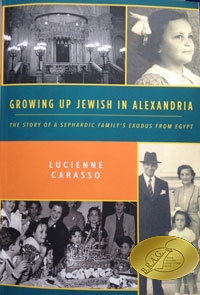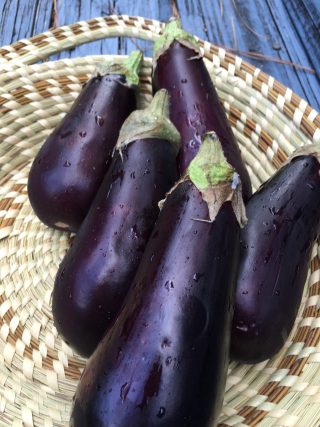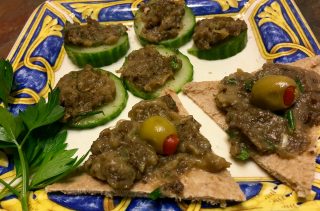Growing up Jewish in Alexandria: The Story of a Sephardic Family’s Exodus from Egypt
By Lucienne Carasso
Susan Weintrob
indieBRAG Food Blogger
A dear friend of mine grew up in Cairo. Her story was quite similar to Lucienne’s so it was natural to call her to ask about recipes from Egyptian Jewish Families. “Recipes?” she responded. “There were no recipes, just cooking!”
She went on to say “a lot of our food was vegetables stuffed with round meat and rice, fried, then you make a tomato sauce with lemon, a bit of sugar, and whatever spices you like. In Egypt, we did not have steaks like here; our cows were skinney. Our cholent (traditional Sabbath slow cooking stew) was meat, garbanzo beans and eggs wrapped separately, Mucluschia soup and of course, a lot of eggplant as a relish, fried or cooked.
A favorite dish from Egypt and, in fact beloved in most of the Middle East, is eggplant relish, commonly known here as Baba Ganoush. Simple, with variations from different traditions, eggplant relish is eaten warm or cold, as a side dish or a snack.
The eggplant is roasted or baked. Seasonings are often distinct to regions and cultures. Serve with sliced cucumbers or carrots or toasted pitah or chips. Relish tastes even better if you refrigerate an hour or so – if you can wait!
Middle Eastern Eggplant Relish
3 medium eggplant
Juice of 1 lemon
3 cloves garlic, minced
1 tablespoon fresh parsley, minced
1 teaspoon Kosher salt or to taste
3 tablespoons extra virgin olive oil
1 tablespoon chopped scallions
Options:
3 tablespoons tahini
1 teaspoon cumin
3 tablespoons mint instead of parsley
½ red bell pepper, small dice
Dash cayenne
- Preheat oven to 400F. Prick skins of eggplant in several places. Place eggplant on parchment lined baking sheet.
- Cook eggplant for 30-35 minutes or until the eggplant become very soft. Remove eggplant and garlic from oven and cools.
- Split eggplant, drain liquid and scrape out all flesh. discard skins. Mash eggplant with fork.
- Add lemon juice, garlic, parsley and salt. Mix with fork. Drizzle olive oit and mix. Garnish with scallions.
Growing up Jewish in Alexandria: The Story of a Sephardic Family’s Exodus from Egypt By Lucienne Carasso
The cozy, secure and settled world of Lucienne Carasso was shattered by the Suez Canal Crisis in November 1956 when the Egyptian government of Gamal Abdel Nasser interned her father and uncle. This marked the beginning of the end of the century-long sojourn of her extended Sephardic family in Alexandria, Egypt. Her memoir poignantly depicts her life, first as a coddled and protected girl, then as a teenager, experiencing the manifold changes forced onto her multilingual, cosmopolitan family in the wake of these political events. She shares the magical world of her childhood in the rich, multifaceted city of Alexandria, while giving the reader a sense of the greater historical forces which caused the multiple peregrinations of her family from Spain (following their expulsion in the fourteenth or fifteenth century), first to Italy, then to the Ottoman Empire (Salonika), to Egypt several generations later, with their ultimate emigration to America. She successfully portrays the arc of her life while weaving in the stories of her patrician grandmother and other family members into the tapestry of Egyptian history. Her father Léon’s love for ships and international commerce and her family’s deep connection to Spain lead her to investigate what she can reconstruct of her family’s odyssey around the Mediterranean



I once read a stunning potrait of the Jews of Alexandria in Andre Acimen’s “Out if Egypt” His depictions of his family’s sophistication, and how seemingly “ordinary” it was for that time for this group of people, deeply impressed me, and sound so similar to what you have written in your review. The cultural legacies of the Sephardic culture, and not jusy in N Africa, are deserving continued study. Thanks for this, I really enjoyed! Michelle
We are very proud to have “Growing Up Jewish in Alexandria” as a B.R.A.G.Medallion Honoree! I hope you have an opportunity to read this book and encourage authors like Ms. Carassa to continue telling their stories!